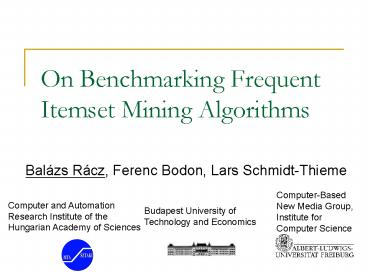On Benchmarking Frequent Itemset Mining Algorithms - PowerPoint PPT Presentation
1 / 20
Title:
On Benchmarking Frequent Itemset Mining Algorithms
Description:
Budapest University of Technology and Economics ... Computer-Based New Media Group, Institute for Computer Science. History ... good theoretical data model yet ... – PowerPoint PPT presentation
Number of Views:68
Avg rating:3.0/5.0
Title: On Benchmarking Frequent Itemset Mining Algorithms
1
On Benchmarking Frequent Itemset Mining Algorithms
- Balázs Rácz, Ferenc Bodon, Lars Schmidt-Thieme
Computer-Based New Media Group, Institute for
Computer Science
Computer and Automation Research Institute of the
Hungarian Academy of Sciences
Budapest University of Technology and Economics
2
History
- Over 100 papers on Frequent Itemset Mining
- Many of them claim to be the best
- Based on benchmarks run against some publicly
available implementation on some datasets - FIMI03, 04 workshop extensive benchmarks with
many implementations and data sets - Serves as a guideline ever since
- How fair was the benchmark and what did it
measure?
3
On FIMI contests
- Problem 1 We are interested in the quality of
algorithms, but we can only measure
implementations. - No good theoretical data model yet for analytical
comparison - Well see later would need good hardware model
- Problem 2 If we gave our algorithms and ideas to
a very talented and experienced low-level
programmer, that could completely re-draw the
current FIMI rankings. - A FIMI contest is all about the constant factor
4
On FIMI contests (2)
- Problem 3 Seemingly unimportant implementation
details can hide all algorithmic features when
benchmarking. - These details are often unnoticed even by the
author and almost never published.
5
On FIMI contests (3)
- Problem 4 FIM implementations are complete
suites of a basic algorithm and several
algorithmic/implementational optimizations.
Comparing such complete suites tells us what is
fast, but does not tell us why. - Recommendation
- Modular programming
- Benchmarks on the individual features
6
On FIMI contests (4)
- Problem 5 All dense mining tasks run time is
dominated by I/O. - Problem 6 On dense datasets FIMI benchmarks
are measuring the ability of submitters to code
a fast integer-to-string conversion function. - Recommendation
- Have as much identical code as possible
- ? library of FIM functions
7
On FIMI contests (5)
- Problem 7 Run time differences are small
- Problem 8 Run time varies from run to run
- The very same executable on the very same input
- Bug or feature of modern hardware?
- What to measure?
- Recommendation winner takes all evaluation of
a mining task is unfair
8
On FIMI contests (6)
- Problem 9 Traditional run-time (memory need)
benchmarks do not tell us whether an
implementation is better than an other in
algorithmic aspects, or implementational
(hardware-friendliness) aspects. - Problem 10 Traditional benchmarks do not show
whether on a slightly different hardware
architecture (like AMD vs. Intel) the conclusions
would still hold or not. - Recommendation extend benchmarks
9
Library and pluggability
- Code reusal, pluggable components, data
structures - Object oriented design
- Do not sacrifice efficiency
- No virtual method calls allowed in the core
- Then how?
- C templates
- Allow pluggability with inlining
- Plugging requires source code change, but several
versions can coexist - Sometimes tricky to code with templates
10
I/O efficiency
- Variations of output routine
- normal-simple renders each itemset and each item
separately to text - normal-cache caches the string representation of
item identifiers - df-buffered (depth-first) reuses the string
representation of the last line, appends the last
item - df-cache like df-buffered, but also caches the
string representation of item identifiers
11
(No Transcript)
12
Benchmarking desiderata
- The benchmark should be stable, and
reproducible. Ideally it should have no
variation, surely not on the same hardware. - The benchmark numbers should reflect the actual
performance. The benchmark should be a fairly
accurate model of actual hardware. - The benchmark should be hardware-independent, in
the sense that it should be stable against the
slight variation of the underlying hardware
architecture, like changing the processor
manufacturer or model.
13
Benchmarking reality
- Different implementations stress different
aspects of the hardware - Migrating to other hardware
- May be better in one aspect, worse in another one
- Ranking cannot be migrated between HW
- Complex benchmark results are necessary
- Win due to algorithmic or HW-friendliness reason?
- Performance is not as simple as run time in
seconds
14
Benchmark platform
- Virtual machine
- How to define?
- How to code the implementations?
- Cost function?
- Instrumentation (simulation of actual CPU)
- Slow (100-fold slower than plain run time)
- Accuracy?
- Cost function?
15
Benchmark platform (2)
- Run-time measurement
- Performance counters
- Present in all modern processor (since i586)
- Count performance-related events real-time
- PerfCtr kernel patch under Linux, vendor-specific
software under Windows - Problem measured numbers reflect the actual
execution, thus are subject to variation
16
(No Transcript)
17
(No Transcript)
18
(No Transcript)
19
Conclusion
- We cannot measure algorithms, only
implementations - Modular implementations with pluggable features
- Shared code for the common functionality (like
I/O) - FIMI library with C templates
- Benchmark run time varies, depends on hardware
used - Complex benchmarks needed
- Conclusions on algorithmic aspects or hardware
friendliness?
20
Thank you for your attention
- Big question how does the choice of compiler
influence the performance and the ranking?






























